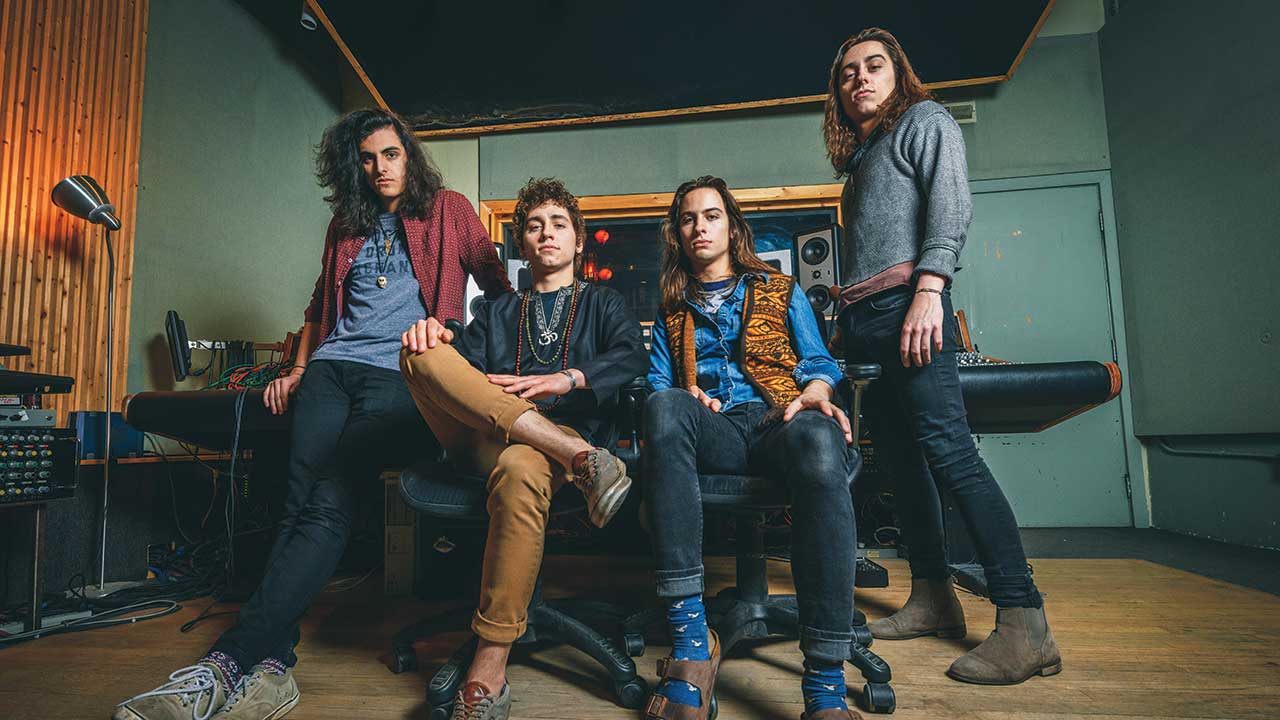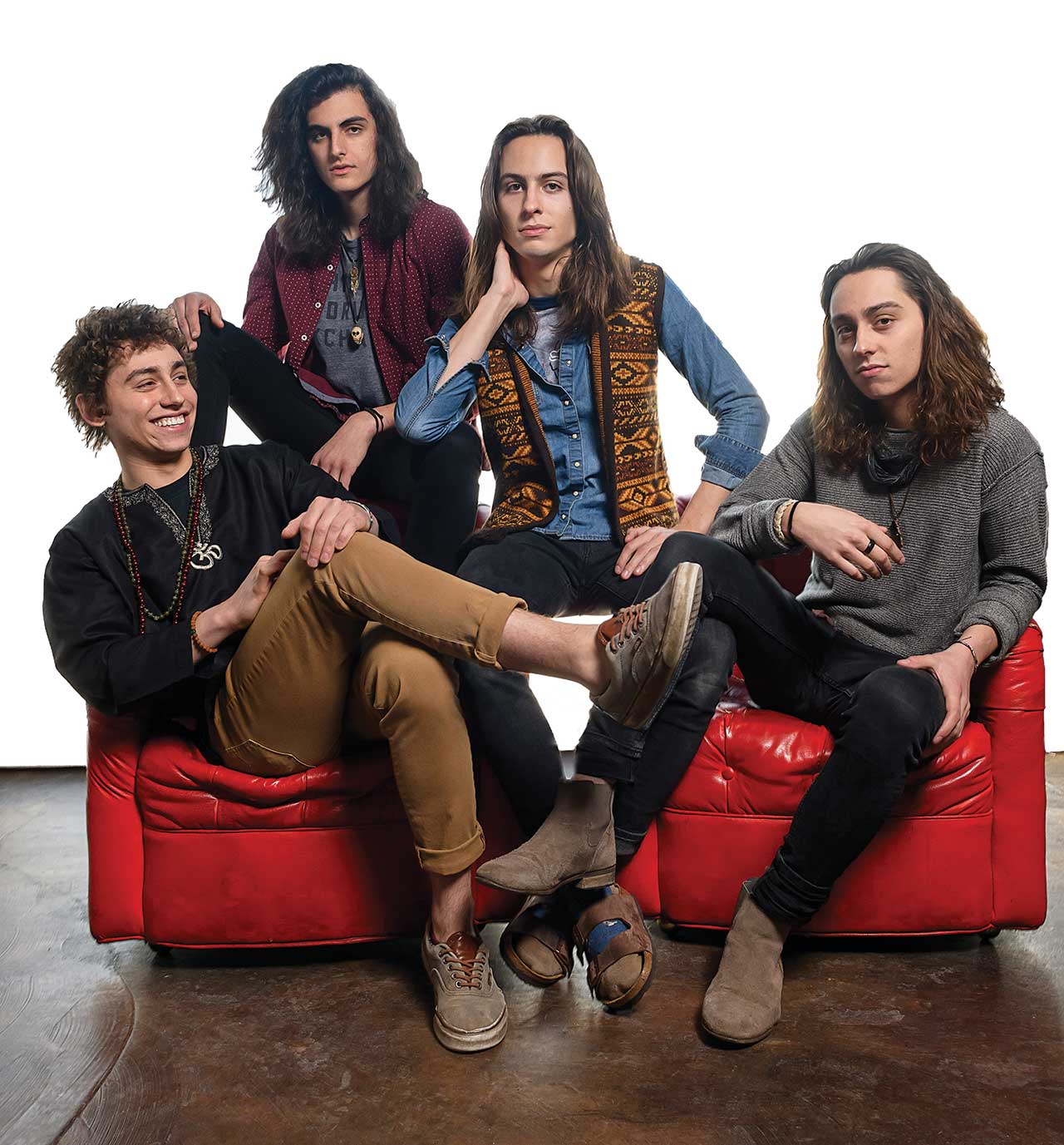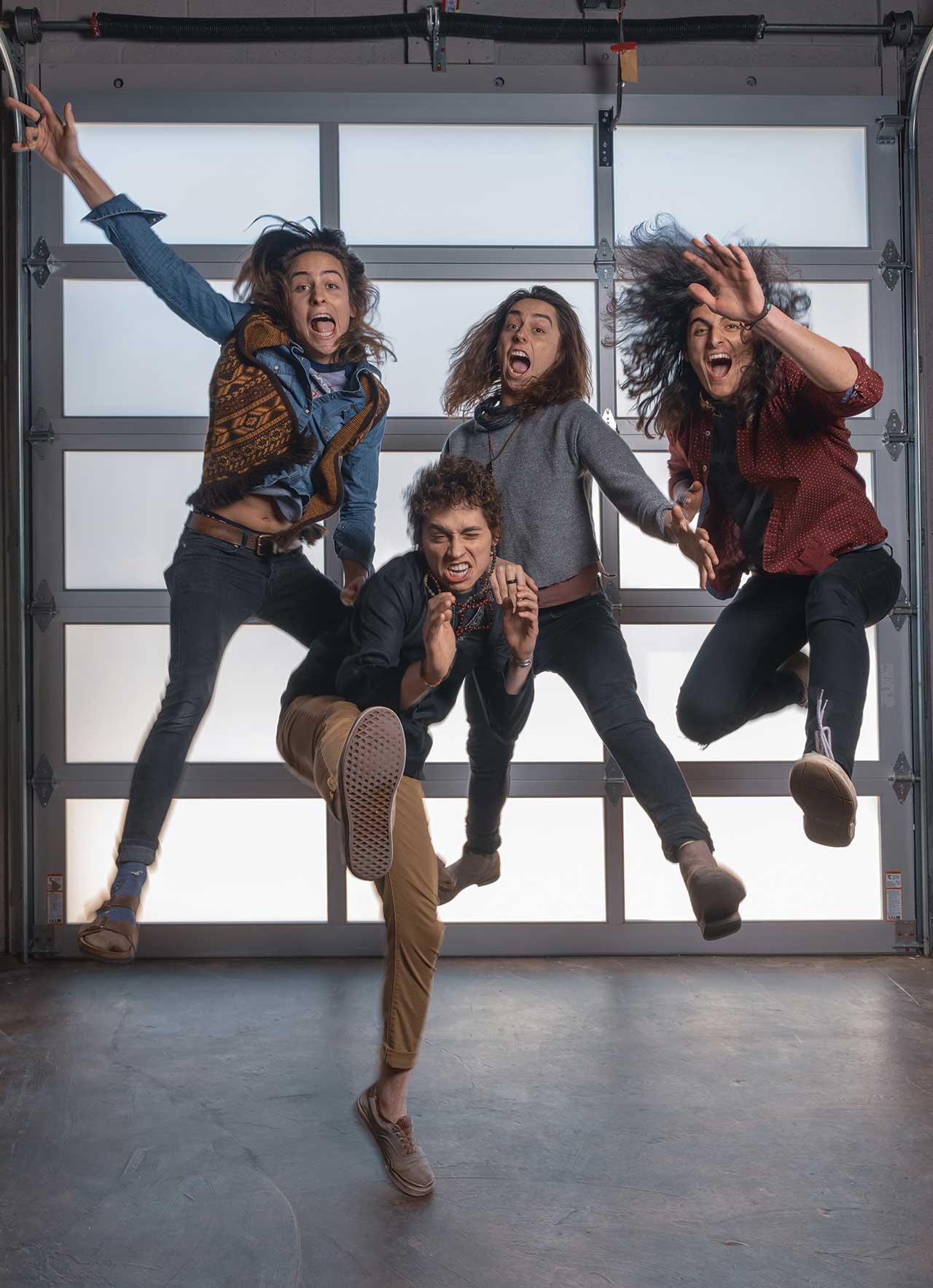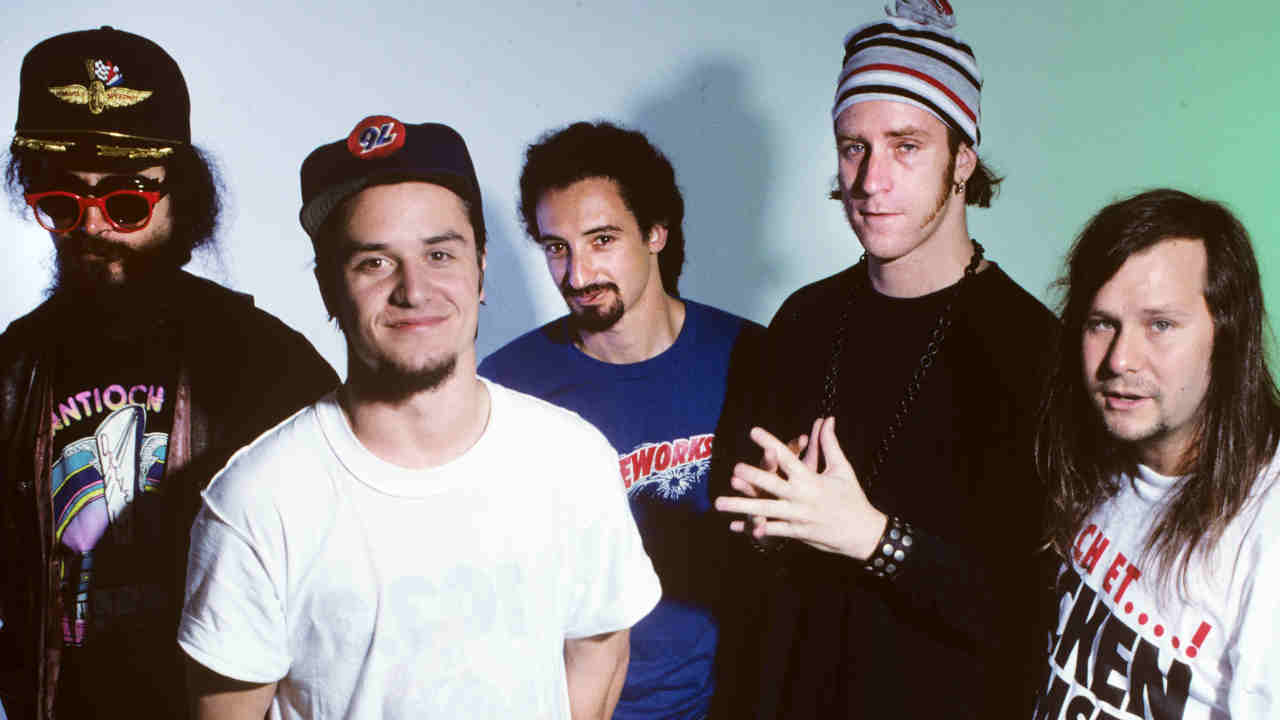Greta Van Fleet interview: "Maybe we’re introducing a new generation of rock’n’roll"
Greta Van Fleet might take inspiration from the past, but they’re poised to take the baton from the old guard of rock greats and carry it into the future

Ask Greta Van Fleet guitarist Jake Kiszka for one specific memory he’d take away from 2018, and he doesn’t spend long thinking about it. It happened back in July, when the young Michigan band were playing at the Quebec City Summer Festival as main support for the Foo Fighters. The huge crowd had put up with light rain throughout the day, but during Greta Van Fleet’s set the heavens suddenly opened and it began to pour down. That’s when Kiszka stepped forward to take an old-school solo.
“I just went down on the deck in the rain and started playing,” says the 22-year-old Kiszka, whose flamboyant, axe-behind-the-head style evokes the great showmen of the past. “There were literally, like, a hundred thousand people there and it just went crazy. It really felt like it struck a deep chord with these people. It was a really visceral reaction.”
That might not seem remarkable, until you consider two things. Firstly, Greta Van Fleet were still three months away from releasing their debut album. That a band who should have still been taking baby steps at that point in their career could draw in so many people indicates just how fast and vertiginous their rise has been. Secondly, and more importantly, that kind of thing isn’t supposed to happen any more. The gatekeepers of cool have deemed that rock’n’roll is a spent force, a once noble beast expending its final pained gasps well away from the concerns of popular culture. And given the scarcity of traditional rock bands who have made any imprint outside the boundaries of their insular scene in recent years, you can see their point.
But Greta Van Fleet are disproving that theory. Whether by accident or design, they’ve tapped into a current of musical populism that has been buried deep for a long time. Few will argue with the notion that they are a band out of time, but right now it feels like they’re ahead of the curve rather than behind it.
“It was only a couple of days ago that I had a realisation that this is significant, what we’re doing here,” says Josh Kiszka, Great Van Fleet’s singer and Jake’s twin brother.
Significant how?
“In that maybe we’re introducing a new generation of rock’n’roll,” he replies. “Which I wasn’t ever convinced of being the case before.”
Sign up below to get the latest from Classic Rock, plus exclusive special offers, direct to your inbox!

“Introducing a new generation of rock’n’roll” is a hell of a pitch, but Greta Van Fleet can make a legitimate claim to it. In less than 18 months they’ve become the most talked-about new guitar band around. Their 2018 debut album, Anthem Of The Peaceful Army, was an out-of-the-gate success on both sides of the Atlantic, while their live shows generate a communal exhilaration from audiences who have been waiting years for an experience this unifying.
No one expected Greta Van Fleet to become quite this big quite so quickly, least of all Greta Van Fleet themselves. Still, they’re just about acclimatising.
“It happened faster than anyone expected,” says Sam Kiszka, bassist and younger brother of Josh and Jake by three years. “It keeps catching me off guard. But it really goes to show that people are ready for a resurgence in rock music.”
Classic Rock spoke to the three Kiszka brothers and non-sibling drummer Danny Wagner separately by phone over the space of two days. It’s difficult to tell exactly what they’re like without being in a room with them, but first impressions are that Josh is eloquent and decisive, Jake quiet and intense, and Sam garrulous and open, while if Wagner is cowed by being in a band with three brothers, and all the familial baggage that brings, he hides it well.
"It was only a couple of days ago that I had a realisation that this is significant, what we’re doing here"
Greta Van Fleet vocalist Josh Kiszka
“I always wanted to put together a band,” says Jake, who says he first picked up a guitar, one of his father’s, at the age of three and has been inseparable from the instrument ever since, “but I never figured it would be with my brothers.”
The Kiszkas and Wagner grew up in Frankenmuth, Michigan, a quiet town (population: 4,944) a couple of hours’ drive north of Detroit. The town was founded by German settlers; today it proudly bears the nickname ‘Michigan’s Little Bavaria’ and is home to the world’s largest Christmas store. The brothers’ childhood was the same as many middle-class kids in rural America. When they weren’t in school, they’d be outside, camping in the woods and building rafts on the river; Huckleberry Finn stuff.
But there were less conventional elements to their upbringing too. Their father, Kelly, has a bachelor’s degree in philosophy, and the Kiszkas were schooled early on in the subject. The house was filled with books, and dinner would be soundtracked with what Josh describes as “deep philosophical conversations” over the gravy boat.
“But there were things he’d warn us to be careful with: ‘You don’t want to get too far into this or that,’” he says. “Nietzsche was one of them. He wouldn’t let us read certain texts at all.”
Instead the young Josh gravitated towards the likes of Henry David Thoreau and Ralph Waldo Emerson, the so-called Transcendentalists – men who sought solitude and independence in nature. “That stuff is about individuality, which I think is the pulse of mankind,” says Josh. “When you strip man of his independence and individuality, you kill peace.”
If this sounds like hippie talk, well, that’s because it is. The singer doesn’t baulk at the description. At one point he calls Greta Van Fleet “a movement – a peaceful reaction to tyranny, to oppression and classicism and racism. There’s no room for that in this world.” Laugh at the earnestness if you want, but it’s difficult to argue with the sentiment.
How do you square that world view with being in a rock’n’roll band in 2019?
Josh: “There’s a challenge behind it that’s part of what makes it so enjoyable. It’s not that we ever set out to be famous or rich or whatever the hell – none of that stuff really mattered to us. What we wanted to do was write music that we wanted to hear and put it out in the world. Share ideas and spread the message of love and peace and unity.”

The last time Greta Van Fleet were in London, in November 2018, they dropped by the Black Heart, a charmingly scuzzy rock boozer in a Camden Town side street. The place holds good memories for the band: in September 2017 they played their first UK show there, in the pub’s 150-capacity upstairs room. “We were still loading our own stuff in,” says Danny Wagner. “I think I carried every piece of my kit up those stairs. We had so much adrenaline going. I think we got to meet everyone after that show.”
Fourteen months on, they were playing a much bigger venue, the 2,300-capacity Kentish Town Forum a mile up the road – and not just one night, but three. That’s going from playing to 150 people to close to 9,000 in just over a year.
If you’ve encountered Greta Van Fleet only on the back of their recent success, you’d be forgiven for thinking they’re an overnight sensation. But YouTube says otherwise. A quick search using the keywords ‘Greta Van Fleet Frankenmuth’ throws up a video dated September 17, 2012. It shows the band playing a cover of Ozzy Osbourne’s Crazy Train on an outdoor stage at what appears to be a town fair. If that wasn’t Greta Van Fleet’s very first gig, it was close. You’d never guess it was them if you didn’t already know: Jake and Sam have short hair, Josh has the sort of chin-length curtain coiffure beloved of teens the world over and a voice a good octave lower than his current banshee wail; original drummer Kyle Hauck is behind the kit.
It’s by no means a star-making performance, but the nascent group still sound remarkably confident for a bunch of musicians barely halfway through their teens.
This would be Greta Van Fleet’s life for the next few years. They’d grab gigs wherever they could, playing places with names like Jan’s Bar And Grill or Cork Pine Eatery or White’s Bar in Saginaw, Michigan. They would finish school on a Friday, spend the weekend playing five-hour stints, then go back to class on Monday, ears still ringing.
At first their set-lists were made up of covers of songs they’d learned from their dad’s record collection – Cream, Led Zeppelin, Bad Company, old blues numbers – but they were gradually replaced by the band’s own material. Jake pinpoints one song, Highway Tune, as the very first thing the Kiszkas wrote together, when he and Josh were 17. “That was really the beginning of Greta Van Fleet to me,” he says now. Highway Tune is currently the most popular Greta Van Fleet song on Spotify, with 36 million plays. Talk about hitting it out of the park first time.
What was the music scene like in Frankenmuth when you formed the band?
Sam: “There was no music scene. The only live music was, like, polka bands. We didn’t really have anything to work with in that respect. We just had each other. And we looked up to the music we listened to and we wanted to make.”
Which was the most memorable gig you played in the early days?
Jake: “We used to play for a few biker gangs in Michigan – backwoods camps that they would have set up. We’d drive two or three hours north, set up a small stage or a trailer, then hook into a generator and play for three hours. A lot of stuff that you see at that age wasn’t normal – they’d be firing off guns in the air and taking all kinds of drugs and were belligerent."
Sounds scary.
Jake: “It was kind of scary. But once you got up and started playing there seemed to be some kind of respect for the band. I think if we’d have been terrible they’d have rioted. We definitely gained respect for that level of musicianship.”
It sounds like you existed in isolation. Did that spur you on?
Josh: “When you’re on your own you’ve got to create your own kingdom and play in it. And that was the ground work for what this became.”

Jason Flom is the founder and CEO of Greta Van Fleet’s label, Lava Records, and a genuine music industry power player. During his 40-year career he’s helped break artists ranging from Skid Row and Stone Temple Pilots to Katy Perry and Paramore. Flom knows the exact moment that he first heard Greta Van Fleet: 4.43pm, November 11, 2016. He knows this because on his phone he still has the timestamped email sent by a colleague. The subject matter said ‘GVF’, and the email contained a link to Highway Tune and a message urging him to check it out.
“I remember, I was sitting with my son, and I put it on and was like, ‘What in the hell is this?” he says. “This is insane. I haven’t heard that sound since back in the day. It was an instant reaction.”
Flom called Greta Van Fleet direct to tell them he wanted to sign them – unseen. The band were astounded; their manager had only sent out the song four days before. This kind of thing rarely happens in the music industry. It certainly never happens when the band in question is made up of a bunch of scrawny kids in vintage clothes playing undiluted rock’n’roll this far into the 20th century.
“A number of things grabbed me,” says Flom. “First, his voice. It’s not from a different era, but from a different planet. And something about the way they create music together, which I realise is because they’ve been playing together since they were little. And then there’s the fact that they were so young. These guys are kids – they were still in high school. It was almost incongruous.”
"Greta Van Fleet is a movement – a peaceful reaction to tyranny, to oppression and classicism and racism. There’s no room for that in this world.”
Greta Van Fleet vocalist Josh Kiszka
Flom’s instincts were on the money. A few influential blogs began writing about the band, then Highway Tune was picked up by American DJ Howard Stern. “Then the record just exploded on the charts,” says Flom.
He puts the band’s booming success down to old-fashioned word of mouth. “Rock fans don’t generally stream. They’re buying a lot of albums, CDs. Everybody’s telling everyone else about it. It sounds like a cliché, but it’s been so organic.” Whatever the reason, it worked. When it was released in October 2018, Anthem Of The Peaceful Army entered the US Billboard chart at No.3 and the UK album chart at No.12. The band’s detractors – more on them in a second – will say that their success was a shoe-in, that the formula goes: ‘young kids + familiar sound + major-label muscle = $$$$’. And maybe that’s possible. But if it was that easy, why isn’t everybody doing it?
Do you ever think: “Out of all the bands out there, at a time like this, why us?”
Jake: “No. I haven’t asked. But I would say it’s because we’re a bunch of kids who play rock’n’roll, who were inspired to be the greatest musicians they can be. Maybe that was enough.”
How do you think you’ve become so successful?
Danny: “It’s intensive word of mouth. Which is a rare thing nowadays. It’s people interacting with each other. And we get to interact with them.”
Does it feel like you’re successful because you’re so against the grain, at least compared to everything else in the charts these days?
Jake: “Yeah, I think it does. There’s something really inspiring about the fact that it’s not necessarily like anything else. Maybe people are shying away from it because of what people might say – almost an element of fear, because of the context. But this is the music we grew up with, it’s ingrained in us. We’d have to go out of our way to sound differently to the way we do now.”
During their 18 months in the spotlight, Greta Van Fleet have amassed a sizeable following. Slash is among the musicians who have sung their praises, albeit with a caveat: “I wish they didn’t sound so much like Led Zeppelin,” he said, “but still, the idea of fuckin’ four kids getting on stage and just playing their fuckin’ asses off… I think that’s inspiring.”
Elton John was unequivocal in his praise. The Rocket Man turned up at one of the band’s shows at London’s 1,000-capacity Islington Academy in April 2018, and invited them to play at his annual Oscars party a few months later (he advised them to “flaunt it” more). And then there are the several hundred thousand people who have bought Anthem Of The Peaceful Army. And the 36 million who have streamed Highway Tune… (Not to mention the other 150 million plus who have streamed the band on YouTube and Spotify.)
Inevitably, there’s a smaller but more vocal group of haters, who have crucified the band for everything from lack of originality to gaucheness to being complicit corporate playthings. “They are a new kind of vampiric band who’s there to catch the runoff of original classic rock using streaming services’ data-driven business model,” read influential music website Pitchfork’s scathing review of Anthem Of The Peaceful Army.
In truth, Greta Van Fleet leave themselves open to that kind of attack from all sides. They aren’t original; there’s no escaping the similarities to Led Zeppelin in general and, in Josh Kizska’s case, Robert Plant specifically (something Plant himself has acknowledged wryly). They are guilty of gaucheness – claiming that, no, Zeppelin aren’t a huge influence. And expecting people to believe that definitely qualifies as naïve. Complicit corporate playthings? Might be true, might not. How many people who aren’t underground rock fundamentalists or music journalists really give a shit anyway?
Still, the band themselves are impressively sanguine about all the negativity. “It’s unfortunate that they go out of their way to put that kind of energy out,” Josh says with an shrug, “but that’s their prerogative.”
How does it feel when you’re criticised like that?
Jake: “It’s strangely reassuring. As much as some people admire what you’re doing, there’ll always been a counterpoint to that, there’ll always be someone who hates what you do. And I think that’s a beautiful thing. It’s not really art if you’re not pissing anyone off.”
Come on, you’re just saying that. It must hurt. Or at least piss you off.
Jake: “No. I don’t think it’s pissed any of us off. We’ve never had a conversation where we’re irritated by what someone’s written or said or how someone feels.”
One thing your detractors say is that you’re not bringing anything new to the table. Are you?
Jake: “I think so, yes. It would be a puzzling thing to identify ourselves as a throwback band, because we’re a product of our generation. The music that was written during the cultural revolution – the building blocks of the genre itself – we’re maybe broadcasters of that. But we’re broadcasting it for our generation. We’re picking up where those bands left off and moving forward with it.”
If there’s a secret to Greta Van Fleet’s success, then that’s it right there. Granted, the fact that they’re trading in familiar musical currencies helps, and, naturally, the backing of a huge label doesn’t hurt. But they’re offering something that’s both pure in intent and exhilarating in delivery. Because let’s face it, if it wasn’t, then Greta Van Fleet would still be stuck in White’s Bar, Saginaw, Michigan, and we wouldn’t be having this conversation now.
“There hasn’t been a real breakout rock band – rock with a capital ‘R’ – in quite some time,” says Jason Flom. “The ones who have made a dent have been hybrids of different sounds. With Greta Van Fleet it’s just a bunch of guys with guitars and bass and drums; no synthesisers, no DJs. It’s pure.”
Greta Van Fleet are being called the saviours of rock.
Josh: "Well, that’s what they’re saying."
Is that a heavy burden to shoulder?
Josh: “Yes it is. But somebody’s got to do it. If we’ve been given an opportunity, I don’t see why we wouldn’t take it. We’re just as sick of manufactured bullshit as everybody. We want to hear real music. Maybe we can inspire enough people to pick up real instruments and make real music from a real place.”
And are you rising to that challenge?
Josh: [Emphatically] “Yes.”

By the time you read this, Greta Van Fleet will be thinking about what comes next. Not just the next single or the next round of arena dates that are being booked for 2019, or the festival headlining slot that is inevitable only a couple of years from now, but how they can change and adapt and grow without sacrificing what they’ve built so far. Jake talks about immersing himself in movie soundtracks; his twin brother has been listening to music from around the world.
“I like to think that we’re wielding a different torch, offering something different to what others have to offer at this time,” says Josh. “I feel at this point that we’re the right people to be doing it.
Introducing a new generation of rock’n’roll – it’s is a dirty job, but someone’s got to do it.
Greta Van Fleet's world tour resumes on February 22. They play The UK and Ireland in March. Tickets are on sale now.
Dave Everley has been writing about and occasionally humming along to music since the early 90s. During that time, he has been Deputy Editor on Kerrang! and Classic Rock, Associate Editor on Q magazine and staff writer/tea boy on Raw, not necessarily in that order. He has written for Metal Hammer, Louder, Prog, the Observer, Select, Mojo, the Evening Standard and the totally legendary Ultrakill. He is still waiting for Billy Gibbons to send him a bottle of hot sauce he was promised several years ago.

